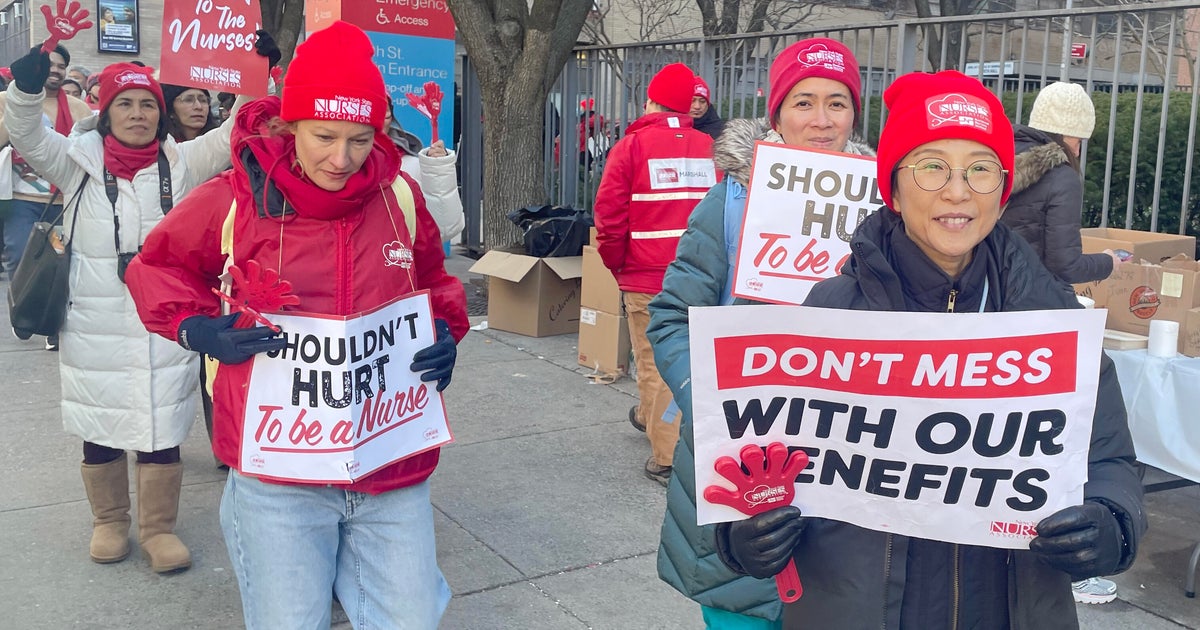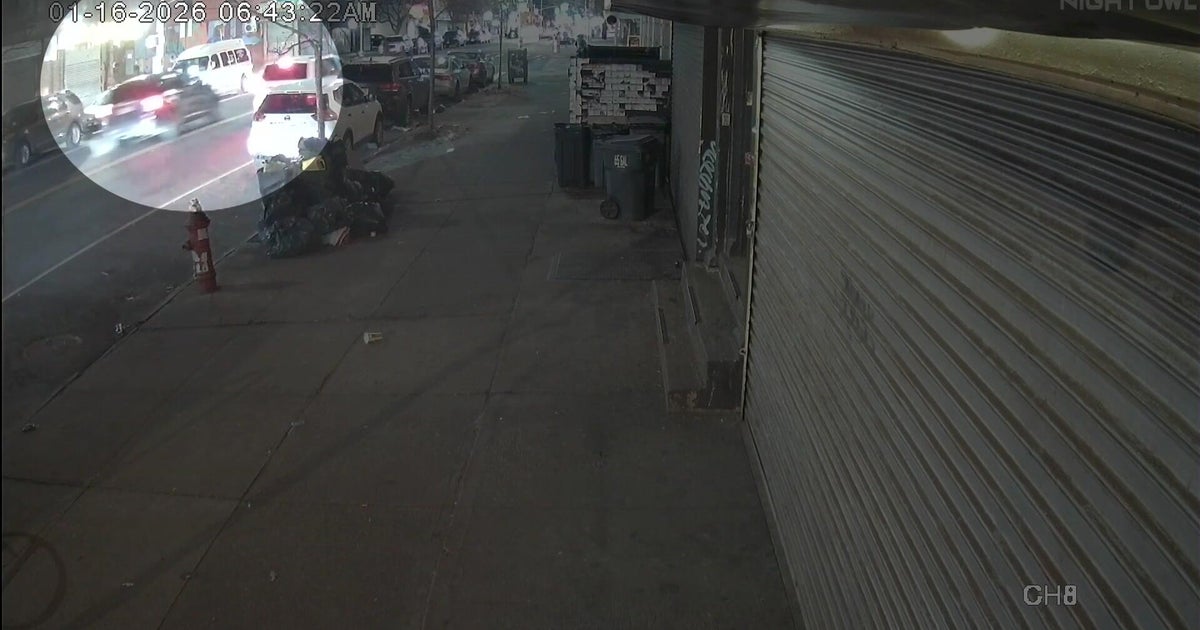Two Chicago area GM and Stellantis plants join UAW strike against Big Three automakers
CHICAGO (CBS) -- Employees at two Chicago area GM and Stellantis plants have joined thousands of other United Auto Workers on strike against the Big Three automakers, as UAW announced all GM and Stellantis parts and distribution centers will join the strike on Friday.
UAW officials had warned that their strike could expand by the end of the week if there wasn't significant progress in contract talks. At the strike of 11 o'clock a.m., the strike indeed expanded.
Until Friday, the strike had been limited to about 13,000 workers at three factories — one each at GM, Ford, and Stellantis. Workers walked out of a GM plant in Wentzville, Missouri; a Ford plant in Wayne, Michigan, near Detroit; and a Stellantis factory in Toledo, Ohio, that produces Jeeps.
In a video statement Friday morning, UAW President Shawn Fain said while the union has made significant progress in contract talks with Ford, GM and Stellantis are still largely rejecting their contract demands.
"To be clear, were not done at Ford. We still have serious issues to work through, but we do want to recognize that Ford is showing that they're serious about reaching a deal. At GM and Stellantis, it's a different story," Fain said.
UAW is now calling on all 38 GM and Stellantis parts and distribution centers nationwide to join the strike.
That includes a GM plant in Bolingbrook and a Stellantis plant in Naperville. Each of those two plants has about 100 union workers.
Typically, car dealers have 30 to 45 days of parts on-hand, so if you need to get a GM or Stellantis car fixed, you should get it to the shop right away, because parts will be running in short supply soon if the strike drags on more than a couple weeks.
GM brands include Buick, Cadillac, Chevrolet, and GMC. Stellantis brands include Chrysler, Dodge, Jeep, Ram, Abarth, Alfa Romeo, Citroen, DS, Fiat, Lancia, Maserati, Opel, Peugot, Vauxhall, Free2move, and Leasys.
Plants now on strike, effective 11 a.m. Chicago time Friday
General Motors
- Pontiac Redistribution, Pontiac, Mich.
- Willow Run Redistribution, Belleville, Mich.
- Ypsilanti Processing Center, Ypsilanti, Mich.
- Davidson Road Processing Center, Burton, Mich.
- Flint Processing Center, Swartz Creek, Mich.
- Lansing Redistribution, Lansing, Mich.
- Cincinnati Parts Distribution Westchester, Ohio
- Denver Parts Distribution Aurora, Colo.
- Hudson Parts Distribution Hudson, Wis.
- Chicago Parts Distribution Bolingbrook, Ill
- Reno Parts Distribution Center, Reno, Nev.
- Rancho Cucamonga Parts, Rancho Cucamonga, Calif.
- Fort Worth Parts Distribution, Roanoke, Texas
- Martinsburg Parts Distribution, Martinsburg, W. Va.
- Jackson Parts Distribution, Brandon, Miss.
- Charlotte Parts Distribution, Charlotte N.C.
- Memphis AC Delco Parts Distribution, Memphis, Tenn.
- Philadelphia Parts Distribution, Lang Horne, Pa.
Stellantis Distribution Centers
- Marysville, Marysville, Mich.
- Center Line Packing, Center Line, Mich.
- Center Line Warehouse, Center Line, Mich.
- Sherwood, Warren, Mich.
- Warren Parts, Warren, Warren, Mich.
- Quality Engineering Center, Auburn Hills, Mich.
- Romulus, Romulus, Mich.
- Cleveland, Streetsboro, Ohio
- Milwaukee, Milwaukee, Wis.
- Minneapolis, Plymouth, Minn.
- Denver, Commerce City, Colo.
- Chicago, Naperville, Ill.
- Los Angeles, Ontario, Calif.
- Portland, Beaverton, Ore.
- Atlanta, Morrow, Ga.
- Winchester, Winchester, Va.
- Orlando, Orlando, Fla.
- Dallas, Carrollton, Texas
- New York, Tappan, N.Y.
- Boston, Mansfield, Mass.
In a statement on Friday, GM said the union's escalation of the strike was unnecessary.
Workers at the Naperville Stellantis distribution center in Naperville headed to the picket line right when the strike expanded. They said they will be there until they put on enough pressure to tip the negotiation needle.
They chanted: "We are the union! The mighty, mighty union!"
"Before, we used to be proud. We used to have all vehicles - pretty much all the Chrysler vehicles. We had quite a few," said UAW Local 1178 President Josie Hernandez, "and now if you look at our lot, we can't even - some of them cannot afford the product that they make."
The Naperville Stellantis facility and the Bolingbrook GM facility are both parts distribution centers. Any parts that are made elsewhere go through a distribution center to get to your dealership or mechanic.
If your car breaks down and you go to a Chrysler, Jeep, or Dodge dealership to fix your car, they might not have the part you're looking for – because workers at the Naperville Stellantis parts distribution center are on the picket line.
"People that got cars out there, they may need a water pump. They may need an alternator," said UAW Local 1178 shop chairman Trey Durant. "You know, it's time for them to get mad, and tell these companies that they need to pay us up as well."
Durant has worked for Stellantis and its predecessor companies since 1995.
"It's bittersweet," said Durant. "We want to be in there to make money for the company; to make money for families."
But while bittersweet the strike may be, Durant is not hesitating to speak out against Stellantis.
"We break our backs six, seven days a week. We work a lot of overtime. We do whatever it takes to make the CEO and the shareholders happy," Durant said. "It's time for them to make us happy."
"There's a lot of us who are going through problems; going through shortages of money - just making sure that we pay either pay for rent or pay our food," added Hernandez.
For many of the UAW workers, a strike was new territory.
"I have not had to do this before," said Jennifer Heiken.
When asked if she was financially and mentally prepared for the strike, Heiken said, "It's stressful."
It is not clear how long the strike will last. While the workers are on the picket line fighting for a better wage, their bills are still due.
"We can't just call up and say, 'Hey, we're on strike,'" said Heiken, "because we're trying to be pay our bills – and it is rough. It's rough. We need that raise."
The striking workers in Naperville had plenty of support from passersby who honked their horns. U.S. Sen. Tammy Duckworth (D-Illinois) stopped by to offer her backing of the strike.
"Americans overwhelmingly support what you guys are doing," Duckworth said. "I think it's only 18 percent that are opposed."
Karl Flinn is a part-time worker at the Naperville Stellantis distribution plant.
"Senator Duckworth was here, and it feels like my voice is being heard," Flinn said.
Flinn says despite putting in the work, his pay doesn't balance out.
"The pay is decent, and the overtime is nice," he said. "But like, I could be making more if I worked at a Starbucks about five minutes further away from here."
While just 15 months with Stellantis, Flinn supports the strike - because others who have been there longer are still not getting their fair share.
"My fellow co-worker who's out here right now, he's been here five years. He's in the same position as me where he's a temp – where we have to stay until the work is done every night," Flinn said.
So they are preparing for the long haul.
"We're going to be out here 24/7 until they bring us that proposal we want," Heiken said.
In a statement on Friday, GM said the union's escalation of the strike was unnecessary.
"The decision to strike an additional 18 of our facilities, affecting more than 3,000 team members plus their families and communities, adds validity to the blueprint identified in last night's leaked texts -- that the UAW leadership is manipulating the bargaining process for their own personal agendas. We have contingency plans for various scenarios and are prepared to do what is best for our business, our customers, and our dealers. We have now presented five separate economic proposals that are historic, addressing areas that our team members have said matters most: wage increases and job security while allowing GM to succeed and thrive into the future. We will continue to bargain in good faith with the union to reach an agreement as quickly as possible."
Stellantis also questioned the union's motives for expanding the strike:
"Following yesterday's publication of comments made by the UAW's Communications Director and the subsequent strike announcement, we question whether the union's leadership has ever had an interest in reaching an agreement in a timely manner. They seem more concerned about pursuing their own political agendas than negotiating in the best interests of our employees and the sustainability of our U.S. operations given the market's fierce competition. The fact is, we made a very competitive offer yesterday that includes all our current full-time hourly employees earning between $80,000 and $96,000 a year by the end of the contract (a 21.4% compounded increase); a long-term solution for Belvidere; and, significant product allocation that allows for workforce stability through the end of the contract. And yet, we still have not received a response to that offer. We look forward to the UAW leadership's productive engagement so that we can bargain in good faith to reach an agreement that will protect the competitiveness of our Company and our ability to continue providing good jobs."
The union's move to escalate the work stoppage highlights how far the sides remain apart on core union demands, which include a 36% pay increase across a four-year contract, annual cost-of-living adjustments, pension benefits for all employees, greater job security and a four-day work week.
"We're not going to wait around forever for a fair contract," he said. "The companies know how to make this right."
The automakers argue they're facing pressure to keep costs low in order to compete with Tesla and foreign car makers, while also investing money into the rapidly growing electric vehicle market. The companies also say their counteroffers are reasonable, while signaling they are willing to negotiate further.
"If we don't continue to invest, we will lose ground — quickly," GM President Mark Reuss wrote Wednesday in an op-ed published in the Detroit Free Press. "Our competitors across the country and around the world, most of whom are non-union, will waste no time seizing the opportunity we would be handing them."
Stellantis, the parent company of Chrysler, Dodge, Jeep and RAM, made a counteroffer on Wednesday, which the union said it was reviewing.
A key feature of the UAW strategy is the threat of escalating the strike if the union is unhappy with the pace of bargaining.
Fain threatened a complete strike by UAW against the Big Three if there isn't sufficient movement in contract talks.
"We can and will go all-out if our national leadership decides the companies aren't willing to move," Fain said.
The UAW is also seeking limited use of temporary workers and more paid time off, as well as stronger job protections, including the right to strike over plant closings.
The union argues that the Big Three reaped hefty profits as car prices surged during the pandemic, while workers failed to enjoy the same benefits.
"Autoworkers have waited long enough to make things right at the Big Three," Fain said in a video earlier this week. "We're not waiting around, and we're not messing around."
President Biden last week expressed support for striking autoworkers' demand for a larger share of industry profits.
"Companies have made some significant offers, but I believe it should go further — to ensure record corporate profits mean record contracts," Mr. Biden said.
Stand-up strike
The so-called stand-up strike targeting select auto plants kicked off on September 15 after negotiations between the automakers and the UAW failed to reach a new labor agreement before their contract with union members expired.
Automakers responded by announcing temporary layoffs at some factories, beginning with Ford Motor which had temporarily laid off 600 non-striking workers at its assembly plant in Wayne, Michigan, on September 15, only hours after employees at the facility had walked off the job.
Stellantis announced Wednesday it was temporarily laying off 68 workers at a plant outside Toledo because of the ongoing strike, with more layoffs expected at its transmission plant in Kokomo, Indiana. GM said it will lay off 2,000 workers at its plant in Kansas City, Kansas, because there's no work for them since they depend on parts from the Wentzville facility.
Workers from those plants will now be paid through the UAW's $825 million strike fund.
Experts say the economic impact of the UAW strike could extend beyond the auto industry. A work stoppage lasting three weeks could cost the U.S. economy $415 million, according to an estimate from The Perryman Group.








